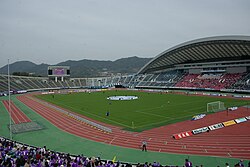 Hiroshima Big Arch (pictured in 2005) held the final | |||||||
| Event | 1992 AFC Asian Cup | ||||||
|---|---|---|---|---|---|---|---|
| |||||||
| Date | 8 November 1992 | ||||||
| Venue | Hiroshima Big Arch, Hiroshima | ||||||
| Referee | Jamal Al Sharif (Syria) | ||||||
| Attendance | 60,000 | ||||||
The 1992 AFC Asian Cup final was a football match which determined the winner of the 1992 AFC Asian Cup, the 10th edition of the AFC Asian Cup, a quadrennial tournament contested by the men's national teams of the member associations of the Asian Football Confederation. [1] [2]